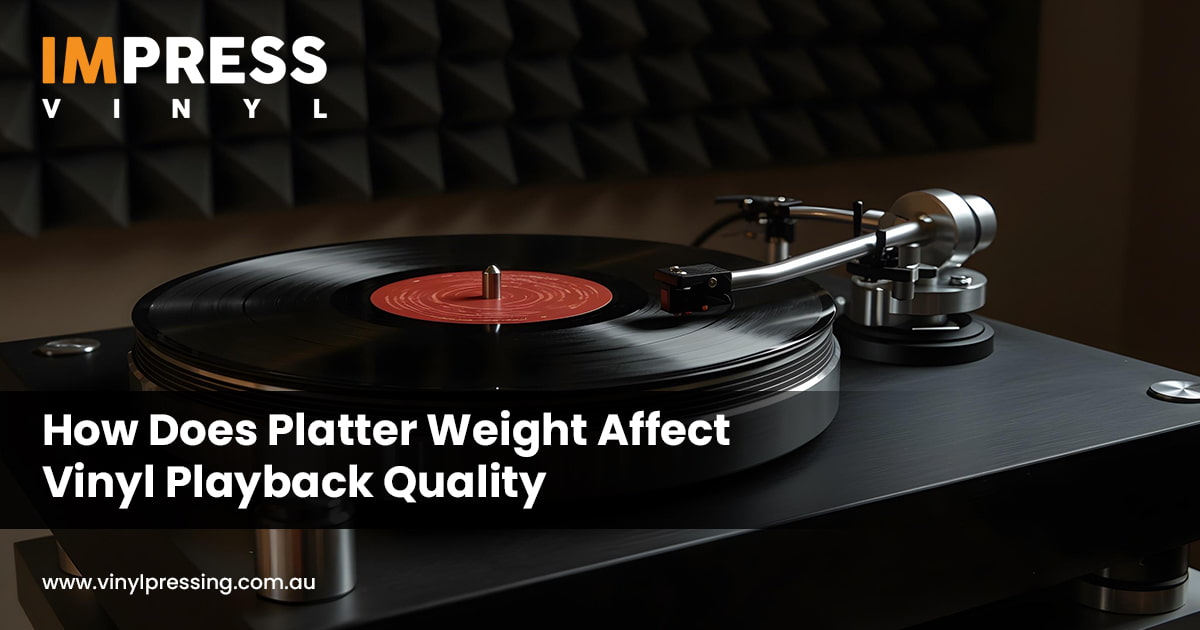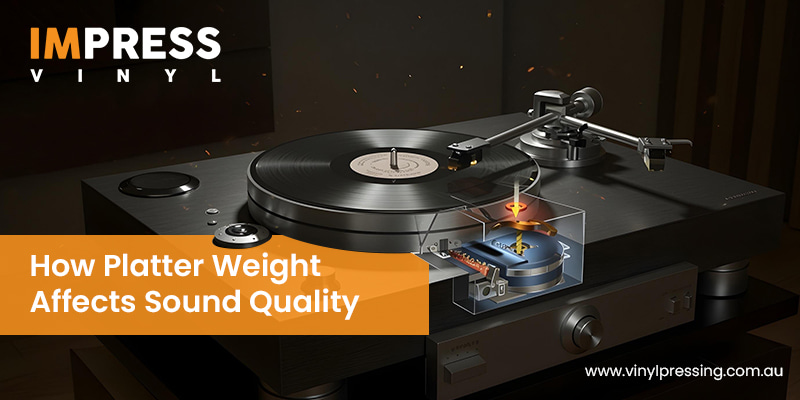How Does Platter Weight Affect Vinyl Playback Quality

Have you ever played a vinyl record and thought something sounds off but you just can’t quite put your finger on it? Maybe the pitch fluctuates slightly or the background is not as quiet and stable as you do expect. While it is easy to assume the stylus, cartridge or speakers are at fault, there is another crucial component that often goes unnoticed that is the turntable platter weight.
Many vinyl enthusiasts, especially those new to the analog audio world, tend to overlook the platter’s role in sound quality. It is easy to focus on the flashier components, like tonearms or cartridges but in truth the platter which is the part of the turntable your record physically spins on has a significant impact on how your music sounds.
A common misconception is that all platters are the same or that their main job is simply to spin the record. In reality the weight and material of the platter can change everything from how stable the rotation is, to how much noise or vibration is introduced, to how dynamic and accurate the playback feels.
So, let’s talk about what exactly is it and how does it influence the overall vinyl playback experience?
What is a Turntable Platter?
Before we learn why weight matters, let us get a quick understanding of what the platter is.
The platter is the circular surface on a turntable that your vinyl record player platter sits on while it spins. It is directly responsible for the rotation of the record and, by extension, the stability and quality of the sound you hear. It’s essentially the “stage” on which the vinyl performs.
Platters come in various materials including aluminum, acrylic, glass, steel, MDF (medium-density fiberboard) and more. But aside from material, weight is a critical characteristic that can heavily influence playback quality.
How Platter Weight Affects Sound Quality

Let us break this down in a more relatable way. Imagine spinning a lightweight plastic plate on your finger. It wobbles, right? Now replace it with a solid, heavier metal disc. Instantly, the spin becomes smoother and more stable. The same principle applies to turntables.
-
Improved Rotational Stability
One of the main benefits of a platter weight and vinyl playback is rotational inertia. This is a physics term but here is what it means in simple words: a heavier object resists changes in motion more than a lighter one. In turntable terms this means that once a heavier platter gets up to speed, it maintains that speed more consistently.
So why is that important?
Because the key to good vinyl record player platter playback is a constant, steady speed. If the speed varies even slightly (known as wow and flutter), it can distort the pitch and make music sound wobbly or uneven. A heavy platter minimizes these inconsistencies, leading to more accurate and faithful audio reproduction.
Everyone personally noticed this at the time of upgrading your entry-level turntable. The heavier platter made even my older records sound smoother and more lifelike.
-
Better Vibration Damping
Vinyl records are extremely sensitive. They pick up not just the vibrations in the grooves but also any unwanted vibrations from the motor, the room or even footsteps nearby.
Heavier platter weight and vinyl playback and especially those made of dense materials like acrylic or aluminum, do a much better job at absorbing and dampening these vibrations. This means less noise, clearer highs and more accurate bass.
You will often hear audiophiles talk about “background blackness” , that silent canvas upon which the music paints its story. A heavy platter helps create that silent background which allows every note to shine.
-
Reduced Resonance
Every material resonates at a certain frequency. Cheaper, lighter platters (like plastic or hollow metal) tend to resonate more, which can color the sound coming from the record.
A heavy platter made from acoustically inert material significantly reduces unwanted resonance. That translates to a cleaner, more neutral sound profile. It is almost like listening to the music just as the artist and producer intended.
The Trade-Off: Does Heavier Always Mean Better?
Not necessarily. While a heavier platter generally improves sound, it is not a one-size-fits-all situation.
-
Strain on Motor and Bearing
Heavier platters demand more torque from the motor to get up to speed. If your turntable isn’t designed to handle that weight, it could wear out the motor or bearing over time. So, simply placing a massive platter on a basic turntable won’t magically enhance its performance and it might actually harm it.
-
Longer Start-Up Times
This is a minor point but heavier platters take longer to reach full speed. Most of us don’t mind waiting an extra second or two but if you are into DJing or quick cueing then it could be a small inconvenience.
-
Cost and Compatibility
Heavier platters are often found on high-end or audiophile-grade turntables. Upgrading a platter may also require you to consider platter mats, spindle length and tonearm adjustments. It is not always a plug-and-play upgrade.
A Complete Story: Platter Material And Weight
Well let’s not forget that weight is just one part of the platter story. The material also has a big impact.
- Acrylic platters mimic the density of vinyl records and reduce static. Great for warm, natural sound.
- Aluminum platters are solid, durable, and offer fantastic rotational stability.
- Glass platters look stunning and offer good mass but are often paired with mats to prevent slippage.
- MDF platters are lighter but acoustically neutral, often found in mid-range systems.
When experimenting with acrylic vs. aluminum platters of similar weights, It is recorded that subtle tonal differences—acrylic gave my records a warmer sound, while aluminum offered more clarity and punch.
Should You Upgrade Your Platter?
Here is the most important question: Will upgrading to a heavier platter improve your listening experience?
If you are using a basic turntable and feel like your records could sound better and yes, it is worth considering. But do your research. Make sure your turntable can handle the added weight and ensure compatibility with the motor and bearing.
Sometimes, even adding a platter mat or record weight can simulate some benefits of a heavy platter without the full upgrade.
Final Thoughts
In the vinyl world, every element contributes to the final sound from the stylus to the cartridge, tonearm, motor and yes, the humble platter. Heavier platters can provide smoother playback, better detail, improved dynamics, and reduced distortion. But like any part of your audio system, it works best when in harmony with the rest of the setup.
If you are serious about getting the most out of your vinyl collection, don’t overlook the platter. It is not just a spinning disc but the silent partner that supports every groove, every note, every memory your music holds.
Looking to upgrade your setup or press your own high-quality records? Explore professional vinyl pressing and turntable solutions at Impress Vinyl where your passion for analog sound meets precision craftsmanship.